'Save the Campbell' is about far more than utilities — here's why
- Oops!Something went wrong.Please try again later.
OTTAWA COUNTY — A group of citizens fighting against "communist" energy policies championed by Democrats now wants to change how local government is structured, taking over privately owned electric utilities in Ottawa County and making them publicly owned and operated.
An initiative called "Save the Campbell" aims to prevent Consumers Energy from decommissioning and demolishing the coal-fired J.H. Campbell Plant in Port Sheldon Township. Organizers of the effort — members of far-right fundamentalist groups Ottawa Impact and The Gideon 300 — say a government-owned electric co-op is possible if voters approve a "home rule charter" on an upcoming ballot.
Experts, however, say the plan isn't realistic and could lead to unintended consequences for the county.
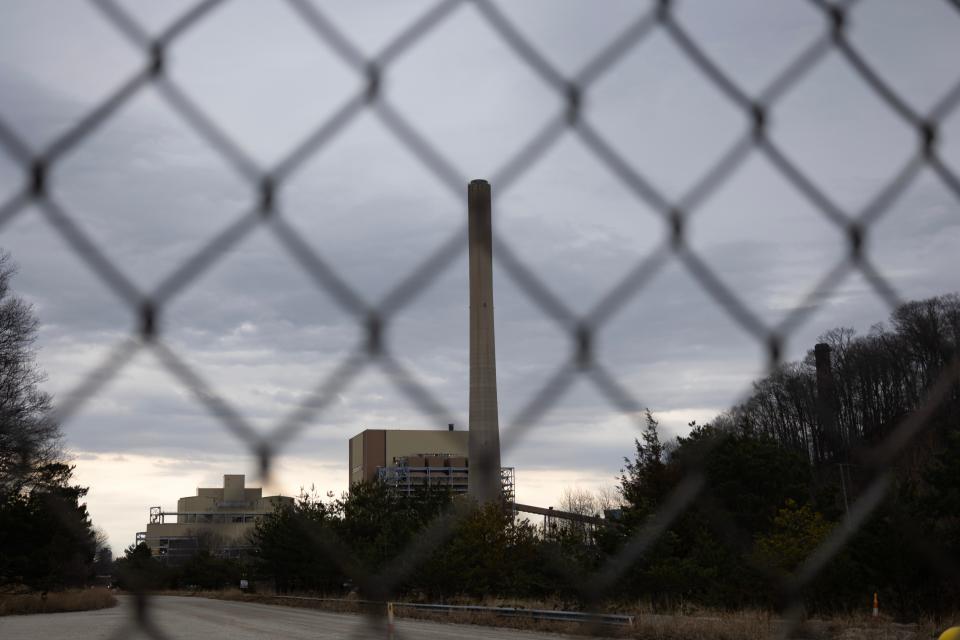
"Creating a charter (to) buy and operate the Campbell Plant is, without question, the worst idea I have heard in 40 years as Ottawa County’s counsel," said Doug Van Essen, the county's former longtime attorney.
'Save the Campbell' is championed by Jenison resident Joe McCarter
McCarter is leading a petition drive to place the charter issue on the August or November ballot. He says green energy policies championed by Democrats like Gov. Gretchen Whitmer are "part of the long-term agenda of off-lining reliable sources like coal and hydroelectric" for unreliable ones like solar, wind and battery storage.
"Local control via the home rule charter is the only legal, effective way to stop the closure of the Campbell Plant," he said prior to a board of commissioners meeting Jan. 30.
Whitmer signed legislation in November that:
Creates new clean and renewable energy generation requirements
An office designed to assist workers with the transition to clean energy
Perhaps most contentiously: The authority for state regulators to override local authorities that deny applications for clean energy facilities like solar farms and wind turbines
Local governments can maintain a level of control if they first pass a "compatible renewable energy ordinance" consistent with state zoning requirements.
McCarter says the new laws strip away choices from municipalities.
"We need to obtain more local control so that Washington, D.C., and Lansing do not impose a misguided agenda on us that makes us the losers and communist China the winner," he wrote in a prepared statement.

"Over 200,000 more acres of Michigan farmland will be wasted on solar farms, and Whitmer’s legislation has overthrown the ability of towns to control it by zoning. It is great for China though, because we buy their solar panels and we will weigh down our manufacturing and agriculture with high-cost, unreliable electric."
McCarter contends coal is still the way to go, arguing it's cheaper than renewables and generates less pollution.
"Coal-generated electricity is much less expensive than solar or wind, and is even less expensive than natural gas," he claimed.
McCarter's plan, published on savethecampbell.com, is "to advise the boards of Ottawa County and Port Sheldon Township" on how to prevent the planned closure and demolition of the plant and, instead, "transfer the title" from Consumers Energy to a member-owned electric cooperative.
But the idea stretches far beyond the Campbell Plant. McCarter said a charter would give the county authority to "municipalize" other electric utility assets, bringing all services in the county under the management of member-owned electric co-ops or cities.
The players behind the plan
McCarter, 60, is the chief financial officer and controller of Highlight Industries Inc. in Grand Rapids, a packaging equipment manufacturer.
He applied for the open District 6 board seat after former commissioner Kyle Terpstra resigned unexpectedly in November.
More: Meet the candidates hoping to fill Ottawa County's vacant seat
During his public interview with the board of commissioners, McCarter, a Texas native, said he admires the current Ottawa Impact majority.
“You all inspired me," he said. "As I saw what you all were doing, in terms of government … when I saw that you really meant it in terms of seeking to preserve our liberties and our Christian principles, it inspired me to get involved.”
McCarter said he views OI as anti-federalist, focused on the separation of powers between the federal government and individual states.
“I think we are a very blessed nation," he said. "We have been blessed by God with the benefits of a heritage that we have to be careful we don't totally squander. We sought to build Christian principles into our government and we need to make sure to preserve them as best we can. It's been a matter of progressive erosion, in my opinion.”
McCarter wasn't selected for the role, but two of the other three finalists — Joel Buck and Lynn Jansen — have joined him in the Save the Campbell campaign.
He's founded a limited liability corporation called Citizens Consulting Group to aid with the project. Members of the group's consulting team are:
David Morren (Allendale), who led a since-suspended recall effort against two non-OI county commissioners last year.
Harvey Nikkel (Jenison), a frequent speaker at county board meetings who claims the COVID-19 pandemic was part of a government conspiracy.
Curtis Clark (Allegan County), who unsuccessfully ran for Michigan’s 4th Congressional District in 2022 as a U.S. Taxpayers candidate.
Timothy Klein (Muskegon County), the owner and chief engineer of TAK Industries, a consulting agency for controls and systems engineering.
Gretchen Cosby, a current OI commissioner and the only member of the team who resides in the same district as the plant. As a sitting commissioner, Cosby could vote on a resolution to place the charter measure on the ballot.
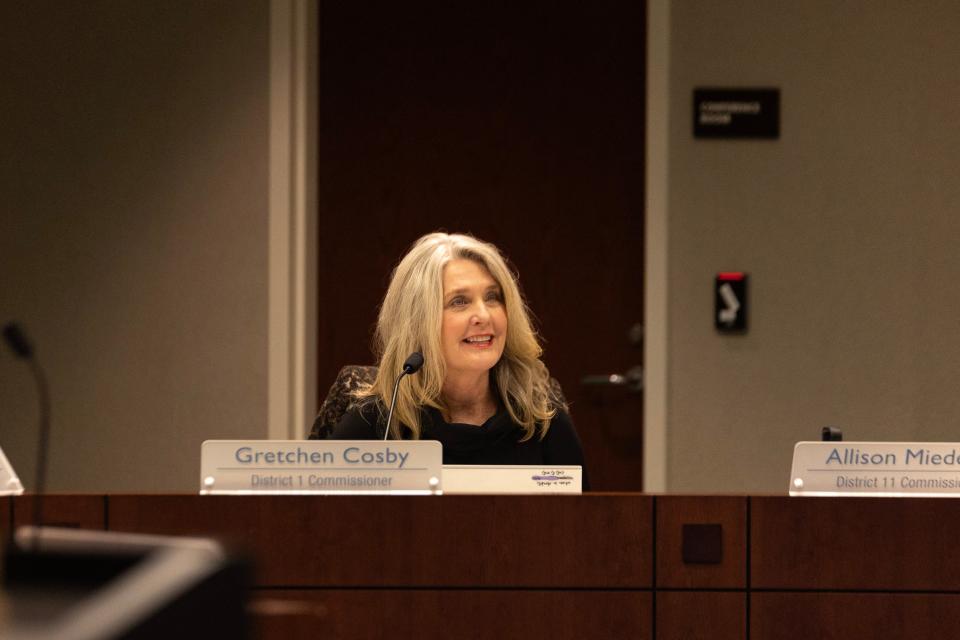
McCarter has also teamed up with a group called Citizens for Local Choice, which launched a statewide petition drive in early January that would undo a part of the new Michigan law pre-empting local policies that are more stringent than the state's zoning requirements.
The Campbell Plant is Consumers' last — and largest — coal-fired plant in the state
The plant, operating since 1962, was originally scheduled to close partially in 2030 and wholly in 2040. But the utility announced in 2021 it was moving the plan up by 15 years for an operations end date of May 31, 2025.
More: Consumers Energy reaches agreement to close Campbell plant, end utility's coal use by 2025
The utility seeks to end coal use altogether by 2025 as part of its goal to achieve carbon neutrality.
Since the announcement, Consumers has been actively preparing the plant for "full retirement," a spokesperson said in an email to The Sentinel.
"The complex will officially go into retirement with an aim to go cold and dark after 2025," said Kristen Van Kley. "In 2026 and on, the complex will be demolished with a plan to restore the site over time."
The plant, when operating at full capacity, can generate 1,450 megawatts of electricity. Michigan consumed about 113,740 gigawatt hours of electricity in 2019, according to a 2020 report from the U.S. Department of Energy.
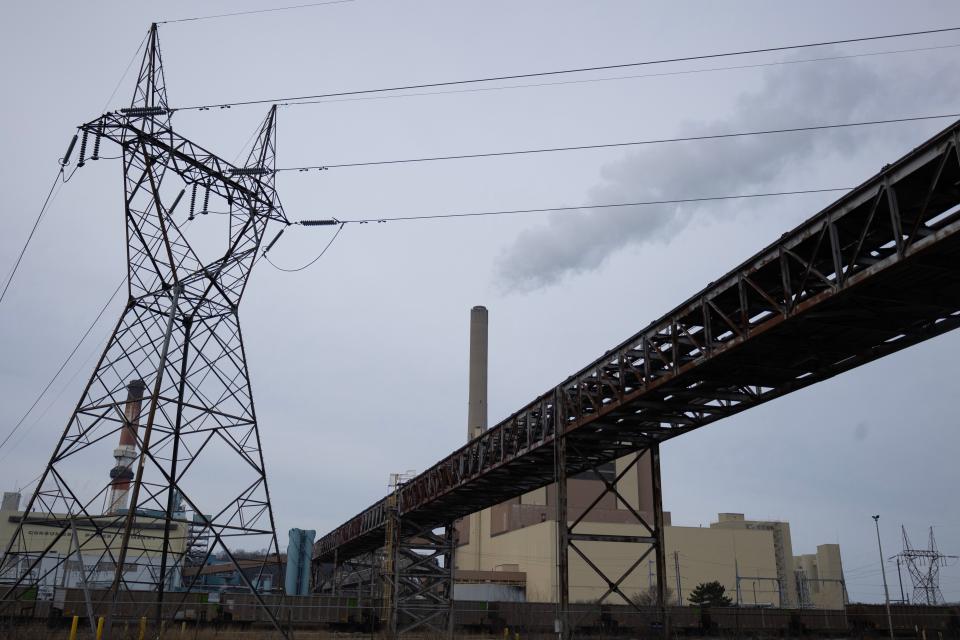
McCarter's Citizens Consulting Group claims Consumers "has needlessly endangered the energy security of West Michigan consumers in its quest to be 'among the first utilities in the nation to go coal-free by 2025.'"
Van Kley said new technologies will ensure Consumers continues to support the statewide grid.
"Energy efficiency, demand response and emerging technologies such as grid modernization and battery storage will help us lower peak customer demand for electricity and deliver exactly what Michigan needs," she said. "Our plan is designed to respond to emerging needs, adapt to changing conditions and embrace emerging innovative technologies as we work to achieve net zero carbon emissions."
Key to that strategy are natural gas-fired plants in Consumers' portfolio, Van Kley said, which include locations in Zeeland, Jackson and a 1,200-megawatt facility that began operating in Van Buren County's Covert Township in June 2023.
Those operations "will supply reliable, on-demand electricity to meet Michigan’s energy needs when renewables and other sources are not available," Van Kley said.
Meanwhile, efforts continue to restart operations at Palisades Nuclear Power Plant in Covert Township. The facility, owned by New Jersey-based Holtec International, went offline for decommissioning in May 2022. An initial, unsuccessful attempt to restart the plant was announced in September 2022. A second, ongoing attempt launched in early 2023.
Nine congressional members, including West Michigan Congressman Bill Huizenga, sent a letter to U.S. Secretary of Energy Jennifer Granholm — a former Michigan governor — and Nuclear Regulatory Commission Chair Chris Hanson asking for “swift consideration” of Holtec’s loan application to the Department of Energy.
Although regulatory decisions still loom, Holtec has cleared several hurdles. A power purchase agreement was secured with Wolverine Power Cooperative in September and Michigan bookmarked $150 million in its 2024 budget to aid the plant’s transition from decommissioning to operations.
A successful restart would pave the way for the plant to add 800 megawatts of baseload generation back to the state's power grid.
More: Has Palisades secured $1.5B? Despite reports, owner says not yet
Local stakeholders are adjusting
Environmental activists were pleased with the new Campbell plan, but local officials had to adjust to a major timeline change.
Township Supervisor Mike Sabatino said, although the accelerated timeline of decommissioning the plant was unexpected, the community has been working for the past several years on an Economic Resiliency Response Plan.
Part of that plan is to account for the loss of the largest source of tax revenue for the township and the Grand Haven Area Public School District. Sabatino said the plant accounted for 15.9% of the township's tax base at the beginning of 2023 — down from 30% in 2021 and likely to be even lower this year.
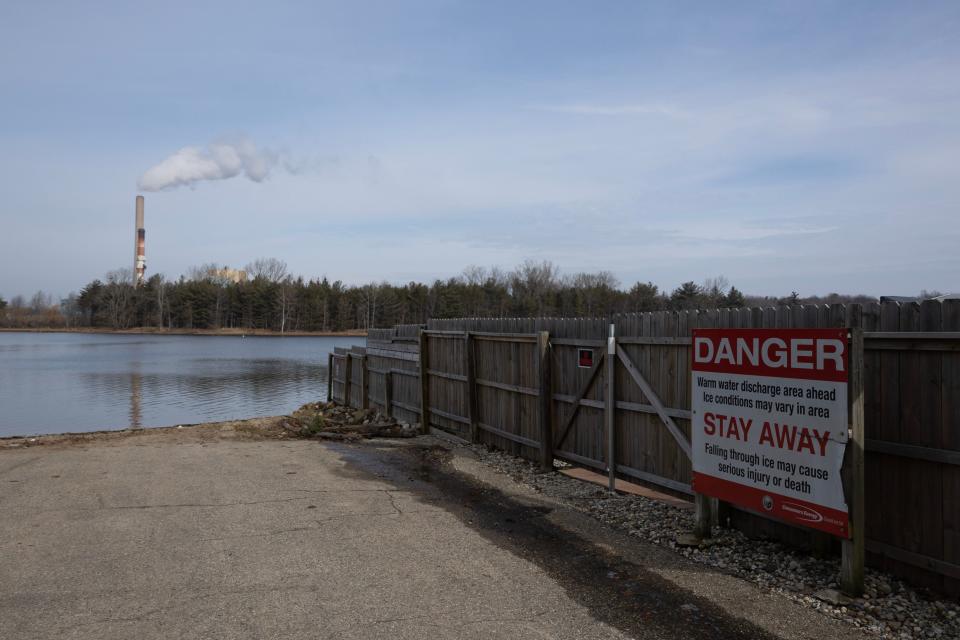
Sabatino said the township asked for proposals as it looks to revise its master plan — which happens to coincide with the decommissioning of the plant. The RFP deadline was Feb. 1 and officials are currently reviewing and scoring them, with the next step being the hiring of a consultant, then getting feedback from residents.
"Part of that is public engagement," Sabatino said. "Part of that is looking at the potential future land use, and if there are any changes that actually take place in the near future."
McCarter's Save the Campbell effort did submit an RFP to the township, Sabatino confirmed. He added the township is "focused on serving its residents' needs" and doesn't have the authority to weigh in on the plant's future.
"The township doesn't own it. It's a private entity. It'd be like me telling you, you can't build a new room onto your house. It's not our role," Sabatino said. "We're serving the township — the health, safety and welfare of the township residents. That's our job."
Van Kley, of Consumers, said the company is committed to ending the use of coal at its properties.
"As part of our transition to clean energy, Consumers Energy has successfully retired seven coal-fired units at three sites in Michigan since 2016. In keeping with past closures, we are committed to a just transition for the J.H. Campbell Complex," she said. "We will ensure that our coworkers, communities and the planet are protected throughout the process of officially retiring the site and the end of coal use by the end of 2025."
After the decommissioning process is completed, Van Kley said the company will "continue to work with the community to find a use for the Campbell site."
Effects of a 'home rule' charter
Ottawa County currently operates as a general law county, where its board of commissioners shares executive and legislative functions with other county-wide elected and appointed officials.
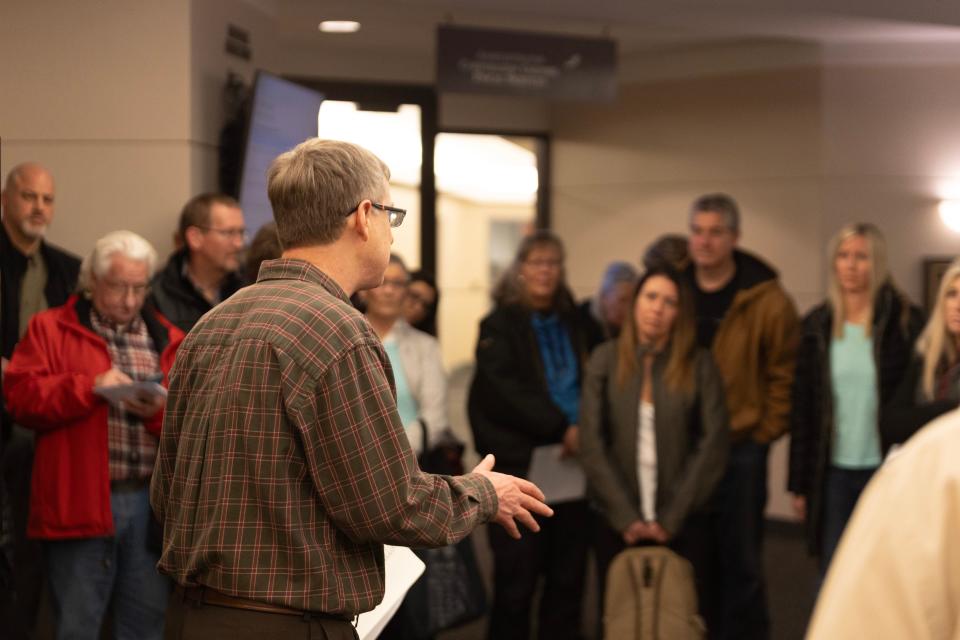
A "home rule" charter would change the structure of government at the county level by converting the administrator position — currently a hired employee managed by the board — into a countywide elected position.
Through the charter, the county would be able to dictate the powers and duties of the administrator, such as whether they have veto power, how staff functions are handled, and which departments they control. Alternatively, the charter could leave such matters for the county board and administrator to sort out.
That would make the top position in the county political, said Van Essen, the county's former longtime corporation counsel.
"The problem with the county’s top administrator becoming an elected county official is that it makes the top administrator 'political' and hired because of popularity, instead of being 'professional,' hired because of training and skill," Van Essen told The Sentinel.
"County government over the past 40 years, even in the areas it traditionally provides services, has become increasingly complicated," he added. "To eliminate 'merit' and 'qualifications' as the characteristics defining the role and making it political would clearly be a step in the wrong direction if good government is the objective."
The charter also permits a county to exercise "limited home rule," which essentially means it can control, operate or enact its own rules, as long as they don't violate the state or federal constitutions and don't conflict with existing state services or agencies.
"(It means) they can do anything that's not prohibited by state or federal law," said Justin R. Long, an associate professor at Wayne State University who studies state constitutionalism and federalism. "That's in contrast to more limited forms of local government, which have specific grants to do specific things, and they can't do anything that's not granted to them.
"A 'home rule' can do anything the state could do, as long as it's not prohibited, and by prohibited I also mean pre-empted, meaning things the state does that it doesn't allow anybody else to do."
That could include things like taxes, Long said.
"If you're limited government, you can only impose property taxes as the legislature says. If you're a home rule locality, then the presumption flips, and it's assumed that any kind of governmental action you take is allowed until someone says, 'Well, no, it's prohibited by this law or that law.'"
That could mean a lot more changes than a countywide energy co-op.
"A charter could also authorize the county to enter the waste pick-up and disposal and hospital industries," Van Essen said. "I find this suggestion truly baffling and absolutely frightening."
In addition to the Campbell effort, McCarter promoted the idea that the county should create a "citizens militia" to "step in and protect against foreign invasion into Ottawa County," citing the U.S. government's struggles with protecting the southern border.
Long said the idea was far-fetched.
"There's really no legal concept called militia," he said.
Even floating the concept of a militia is concerning, said Amy Cooter, director of research and academic development at CTEC, the Center on Terrorism, Extremism and Counter-Terrorism.
"It's weird when government officials, no matter what level they're at, try to formalize a militia under their control in this day and age," she said. "Militia members see themselves as functioning with a purpose outside of the government."
Cooter said experts worry about the intermingling of elected officials and "members" of a militia.
"Even if they try to keep it completely separate from themselves, what we're looking at is a force that would potentially be effectively a private army," she said.
"This particular version ... also has a pretty strong degree of white Christian nationalism, which is not the same as Christianity," Cooter said. "It's a version of politicized religion that picks and chooses from Christianity to try to enforce political dominance."
McCarter has indicated he believes Christians are under threat, referring to legislative attempts to expand the state’s hate crime law to include protections for the LGBTQ+ community.
"This is why we need a county charter which protects Christian speech rights at a time (when) Christian speech is being targeted by the state to be made felonious," he wrote on social media.
Van Essen said the creation of a militia is a non-starter.
"We have a militia," he said. "It's called the National Guard. There's no room in the constitution for two militias. Charter or no charter, a county may not legally create a militia."
To enact the charter style of government, a series of votes would need to take place.
First, the county board must vote to put the measure on the countywide ballot.
This could be preceded by a petition drive with signatures minimally equal to 5% of the number of registered voters in the county — about 12,000 in Ottawa — or the board could vote by simple majority to place the measure on the ballot anyway.
McCarter said surveys are being circulated to gauge public interest, but those surveys are being conducted through Citizens Consulting Group, comprised of Ottawa Impact members and supporters. Ottawa Impact currently controls 7 of the board's 11 seats.
The deadline to make the August primary ballot would be April 30, according to the Ottawa County Clerk's Office.
If voters approved the creation of a charter commission, an apportionment commission would be established and meet within 30 days (Sept. 5) with 60 days (Nov. 4) to draw new districts. The apportionment commission would include the county clerk, county treasurer, county prosecutor and a chairperson from each of the two major political parties.
The apportionment committee could shrink the number of commissioners from 11 to as low as 7 — or rise to as many as 21, under state law.
Mark Brewer, an attorney with Goodman Acker, was involved in the charter creation effort in Macomb County in 2009; Macomb is one of only two counties in the state to fully enact the model (the other is Wayne County).
Brewer said it took several attempts to be successful.
"In Macomb, we used it to shrink the size of the county commission from 25 to 13," he said.
Next, a partisan election of "charter commissioners" would take place, conceivably possible by the Nov. 5 general election.
Once elected, the commissioners must meet within 20 days — at the latest Nov. 25 — and complete the draft charter within 180 days (May 24, 2025). The proposed charter would go to voters for approval, assuming no citizen objects within 30 days of the plan's filing, which could trigger the Michigan Court of Appeals to review the plan.
Once a plan is formed, it must be submitted to the governor's office for approval within 30 days of its completion. Assuming it clears that hurdle, the charter would be placed on another ballot for countywide voter approval.
Brewer said if a majority of voters don't approve the plan, the commission has one more attempt to revise, followed by another countywide vote.
If voters reject the document, the commission would be dissolved and the process would end.
Even if the process were successful, the earliest it could be approved by voters is August 2025, after the Campbell Plant is set for closure. Then, of course, there's the question of how the county would obtain the property.
Consumers has not indicated an interest in selling portions or the entirety of the site. With the power plant in the midst of decommissioning, any sale would need approval from the Michigan Public Service Commission, the agency that regulates public utilities in the state.
Electric co-ops that are member-regulated wouldn't fall under the MPSC, said Matt Helmes, the commission's public information officer.
"The MPSC’s oversight of member-regulated cooperatives is limited to code of conduct, electric choice rates, service territory designation, and service quality and safety standards," Helmes wrote in an email to The Sentinel. "Cooperatives will also be required to meet Michigan’s 100% clean energy standard by 2040."
That means the plant would still need to meet all state and federal environmental regulations, including the laws McCarter wants to change.
Meanwhile, the plant doesn't come cheap.
In the state of Michigan, a property's assessed value is approximately half of its true market value. In 2019, the assessed value of Consumers' property in Ottawa County was $486.5 million, 4.1 percent of the county's total assessed value. That figure included the Campbell Plant and the Zeeland Generating Station.
McCarter's plan doesn't specify how the project would be financed, only that "Consumers Energy would retain a secured interest in the J.H. Campbell Plant until the electric cooperative would have paid off the note payable."
If the charter effort fails, it might not matter.
One of McCarter's recommendations is to "determine with legal counsel whether the board of commissioners can compel municipalization even without a county charter."
That plans involves "eminent domain."
"Eminent domain," or "condemnation," allows governmental authorities in Michigan to take private property for public purposes, such as for the construction of roads, bridges, drains, and gas and electric utility projects — without the owner's consent.
The process in Michigan is complex, according to Brad Springer, an attorney with Scholten Fant with extensive municipal law experience. The first question, he said, whether the board even has legal authority to leverage eminent domain.
"The next question is, do they satisfy the requirements to actually take the property?" Springer said.
Those requirements are defined in the state's Uniform Condemnation Procedures Act, he said.
"The act does not itself give the authority to any public body to take property," Springer said. "It only provides you the required process that must be followed if the public body already has the statutory authority to take private property.
"It means the public body has to show that there's an important public purpose to be accomplished and that there's absolutely no other way to accomplish it, but for taking this private property — that there's a real need for it."
Even then, the county would have to pay Consumers fair market value for the plant and assume all liability for the property — including all environmental contamination and remediation responsibilities.
"Ottawa County has no experience and no capability of operating a complicated utility such as a coal plant," Van Essen said, pointing to the county's ill-fated attempt at operating the Southwest Ottawa County Landfill in Park Township in the late 1970s.
"Ottawa County panicked and purchased it without any experience or management capability. The six years that it operated the landfill were a disaster and it had to close the facility in 1986," he said. "Ottawa County (paid not just) for six years of losses with the landfill, but rather ... hundreds of thousands of dollars each year for the past 35 years and faces such sums indefinitely into the future because of hazardous material control in the aquifer below the dump."
That liability, he said, would pale in comparison to the millions of dollars in liability the county would assume for the fly ash landfill necessary to operate the Campbell Plant.
"There are millions of tons of fly ash on the site that are laden with heavy hazardous metals such as cadmium, mercury and lead," Van Essen said. "Consumers Energy can spread that clean-up cost against its entire customer base in future rates. Ottawa County would be able to spread those millions of dollars only against its tax base and its residents."
Subscribe: Get all your breaking news and unlimited access to our local coverage
The complexity of the plan and the challenges it poses lead some to believe there's an ulterior motive.
"The fact that this electric plant scenario really wouldn't make a political difference or functional difference in what they can do — because of how many steps it would take — makes me wonder if this is an attempt to bring out Republican voters," Long said.
He pointed to a 2010 initiative in Oklahoma that banned the state from implementing Sharia law. It was legally challenged shortly after the vote, but it brought out conservative voters en masse.
"It brought up the most conservative Republican voters. The ballot question brought people to the polls who otherwise wouldn't have bothered to vote — and that's maybe something happening here."
Stakes for county elections are higher than ever across Michigan this year, after a change in state law lengthens terms for commissioners from two years to four. All seats on the county board are up for grabs this year.
— Sarah Leach is executive editor of The Holland Sentinel. Contact her at sarah.leach@hollandsentinel.com. Follow her on Twitter @SentinelLeach.
This article originally appeared on The Holland Sentinel: 'Save the Campbell' is about far more than utilities — here's why

